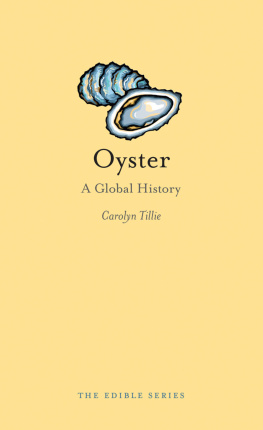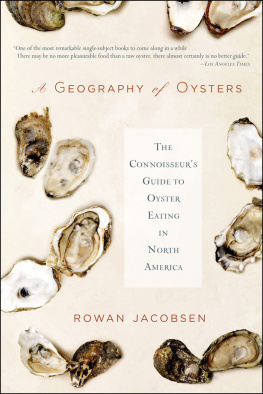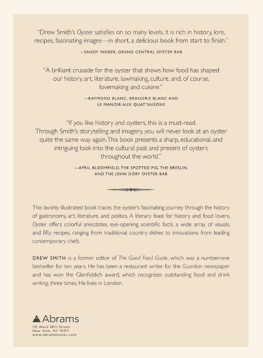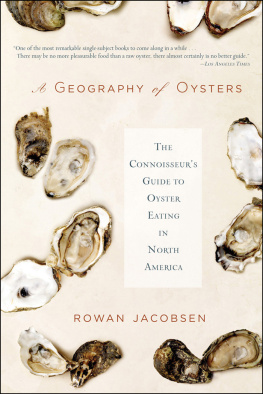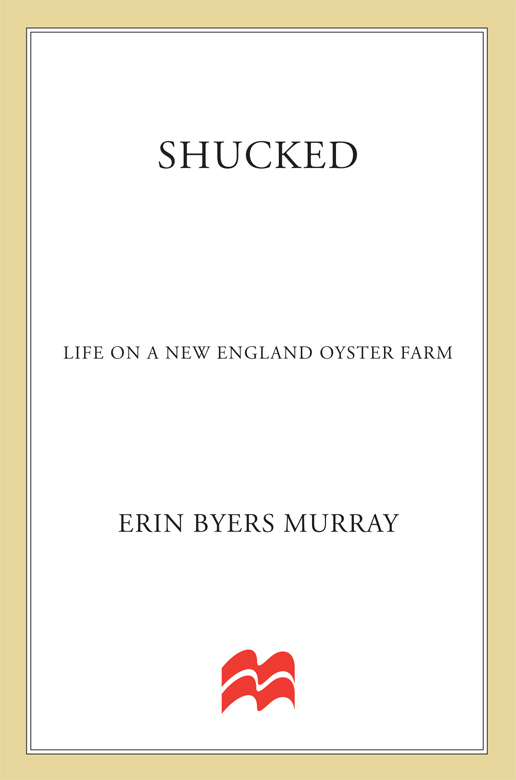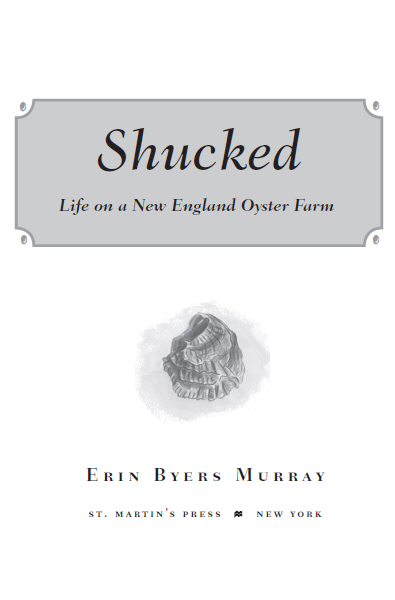
For Dave,
who has made me the luckiest
CONTENTS
Acknowledgments
This book would not have happened if it werent for the efforts, encouragement, and support of so many people. I owe enormous and heartfelt thank-yous (and a couple beers) to them all:
First and foremost, to Skip Bennett for saying yes, for letting a novice boater work on his crew, for trusting me to tell the story, and for giving me so much to strive for.
To Shore Gregory for his friendship, constant encouragement, and teaching me how to say no.
To Andrew Yberg for being a patient teacher.
To everyone at Island Creek, including the growers, my crew, the wholesale team, and especially CJ, Chris, and Cory for wrapping me up in the big bear hug that is the ICO family.
To Garrett Harker for hosting that fateful crab festival and, along with Jeremy Sewall and Tom Schlesinger-Guidelli, letting me join in on those first cautious new restaurant steps.
To all of the chefs who are part of this story, shared their recipes, and fed me along the way, including Seth and Angela Raynor, Jasper White, the Boston scooter gang, Jody Adams, the team at Eastern Standard, the women at French Memories and Snug Harbor, Paul Kahan at the Publican, and especially Jonathan Benno as well as the entire team at Per Se.
To Sascha de Gersdorff for being a thoughtful reader and tireless cheerleader.
To the women in publishing who gave me a stepladder to get started and inspiration on the page, including Alexandra Hall, Annie Copps, Christie Matheson, and Rachel Baker.
To my agent, Danielle Chiotti, for believing my story had heart.
To my editor, Daniela Rapp, for having a firm hand and kind words.
To Nicole Kanner, Jenn Korn, and Karen Carp for being steadfast sisters and giving me wine when I needed it most.
To Jim Williams for teaching me how not to open my first oyster, and along with his wife, Carol, teaching me how to eat it.
To my sister, Shannon, for her lifelong guidance, constant companionship, endless encouragement, and, along with her husband, Brian, bringing Gracyn Byers White into our world.
To my mom, Dottie, and dad, Kelly, who have given me all of my tools and talent, for a lifetime of love and support, an adventurous upbringing, the wisdom to make a home wherever I land, and of course, for never leaving their seats on the roller coaster.
And finally, I have to thank Dave, who knows that there arent enough words to adequately express my appreciation or my love. He is my best friend, my soul mate, my most honest critic, and my rock.
INTRODUCTION
On a steamy midsummer night in August 2008, I was invited to a dinner party at Eastern Standard, a high-ceilinged brasserie in the heart of Bostons Kenmore Square. The restaurants proprietor, Garrett Harker, a tall, silver fox who oversaw one of the most gracious dining room staffs in the city, was also a Baltimore native, and where he came from August was crab season. He was throwing a classic, newspaper-on-the-table, Chesapeake Baystyle festival complete with blue crabs flown up from Maryland, buckets of Old Bay seasoning, and cans of icy cold Natty Boh. It was just my kind of party.
Within minutes of walking in, I met a young, tan, bearded kid wearing sunglasses and a Red Sox cap who looked like he could have walked off the campus at nearby Boston University. He shook my hand firmly and said that his name was Shore Gregory and he was the director of business development at a company called Island Creek Oysters. I immediately did a double take. Not only was a guy named Shore working for an oyster company but he looked like he should have been playing hacky sack on the quad, not directing anyones business.
I was familiar with Island Creek, having eaten their oysters at restaurants around the city. Started in the early 1990s by waterman Skip Bennett, the fifty-acre operation sat forty-five minutes south of the city in a hamlet called Duxbury and quietly nurtured 5 million of the countrys most coveted oysters. They were on every oyster bar menu in Boston and Id seen the Island Creek boat, a traveling raw bar complete with its own cast of male shuckers, set up at high-end fund-raisers. The farmers of Island Creek had a reputation for being a charming bunch of fishermen who loved to have a good time.
Shore introduced me to his young cohorts, a languid blond named CJ, the companys delivery truck driver, and Matthew, another guy in a cap, who handled sales.
We sat down to piles of crabs and as we picked through our shells, I interrogated Shore about his job. He patiently walked me through the history of the company, filling me in on how Skip got started and later, how the dedicated farmer won the hearts of local chefs like Chris Schlesinger, owner and chef of Cambridges legendary seafood spot the East Coast Grill. After September 11, Shore explained, Skips wholesale accounts stopped buying oystersrestaurants everywhere were struggling to pay their bills. Instead of giving up, Skip drove his truck up to Boston, knocked on the back door at the East Coast Grill, and asked the chef if he wanted to buy some oysters directly. Schlesinger, a longtime supporter of local farmers, said yes and then passed Skips name along to his chef friends. Skip gained a reputation for being a backdoor delivery guy and producing some damn good oystersand it helped him grow the business into the incredibly successful outfit it was today. Shore also described the farms yearlong cycle and a bit about how oysters grow. As with wine, he told me, the source of an oysters flavor comes from the precise location where its grown. They called it merroir.
I said the word out loud, feeling it roll around on my tongue. There was something fascinating about it, something evocative. I loved the idea behind it: sense of place. I wanted to know more. I pulled Shore aside at the end of the night and set a date for a tour of the farm.
At the time of Eastern Standards crab dinner, I was the Boston editor for DailyCandy.com, a wildly popular lifestyle and shopping Web site. My job was to scour the city for trendy ideas to drop into the in-boxes of well-off female readers. I was always out and about, my job providing me with a parade of reasons to dress up and socialize: store openings, restaurant fetes, fashion shows, lunches.
But between parties, e-mail blips, Facebook bites, and mad dashes to my daily three oclock deadline, I had shoved much aside to make room for publicists, editors, and shopkeepers. I was more intimately connected to my BlackBerry than Dave, my husband of two and a half years (I only know this because he told me so in an e-mail).
The job, in so many ways, was a dream job. It afforded me a lavish lifestyle; I worked from home, ate well, and took time off to travel. Dave, a lifelong musician, was also a bartender, so mine was the stable career, offering insurance and steady income. We had a hard time coordinating our schedules or finding time for a date, but at least we lived comfortably. It should have been the perfect setup: a crammed social schedule, a good marriage, a condo, a career.
But instead of feeling satisfied or content in that life, I felt achingly empty, lost. It was as though I was missing some essential elementas though Id never discovered who I really wanted to be. By the time I realized it, I was too busy to find out.
Id had a lucrative career trajectory, but along the way Id shelved one of my early passions: writing about food. My first editorial job was at Boston magazine, where as an editorial assistant, then a staff writer, part of my beat was covering the citys food scene. It thrilled me to write about a new restaurant or track the citys (and countrys) food trends. Small plates were hot and craft cocktails were just starting to appear on bar menus. A new league of young chefs was parading into Bostons hottest kitchens and I was there to interview them all. I learned about ingredients, studied up on white truffles, discovered which wine grapes thrived in our New England climate, and searched for the perfect lobster roll. When interviewing a chef about where he sourced his favorite ingredients, I tracked down every purveyor, farm, or retailer he listed. The stories behind an ingredientwhere it came from, who prepared it, why it tasted that wayspoke to me more personally than any other topic I tried.


